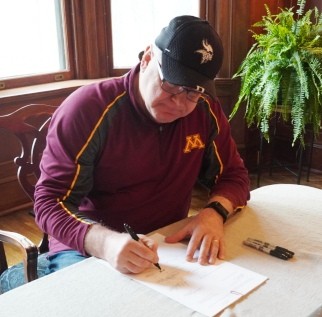Today, Governor Tim Walz signed 11 bills into law, including measures to raise the age to purchase tobacco to 21 and make Minnesota the first state to prohibit  the use of the toxic and long-lasting chemical trichloroethylene (TCE). “At the end of the day, our job is to keep Minnesotans safe,” said Governor Walz. “These strong bipartisan measures will improve public health and reduce preventable health risks. Raising the age to buy tobacco to 21 will help stop addiction before it starts and save young lives.”
the use of the toxic and long-lasting chemical trichloroethylene (TCE). “At the end of the day, our job is to keep Minnesotans safe,” said Governor Walz. “These strong bipartisan measures will improve public health and reduce preventable health risks. Raising the age to buy tobacco to 21 will help stop addiction before it starts and save young lives.”
The Governor’s bill signing today included:
Chapter 88, HF 331: Tobacco 21
Raises the age for Minnesotans to purchase tobacco, tobacco products, electronic delivery devices, and other nicotine products to 21.
The Tobacco 21 bill (HF331) gained strong bipartisan support in the House and Senate, and was championed by lawmakers from across Minnesota. Congress passed national Tobacco 21 in December 2019, and the discrepancy between the state tobacco age (18) and federal law (21) was causing confusion and tying the hands of local law enforcement. In addition to aligning with the federal tobacco age, the bill updates relevant state tobacco definitions, penalties and signage requirements to ensure strong compliance and enforcement. Raising the tobacco age to 21 will help keep tobacco products out of schools, since there are many 18-year-olds but few 21-year-olds in high school social circles. Nearly 95 percent of addicted adult smokers started before 21. The National Academy of Medicine estimates that Tobacco 21 would lead to enormous health gains, including a 25 percent reduction in smoking initiation among 15-to-17-year-olds.
Chapter 84, SF 4073: TCE Ban
Bans the use of TCE for permitted facilities, with narrow exemptions, by June 1, 2022. The bill also provides a process for small businesses to apply for up to one additional year and up to $25,000 in zero-interest loans to transition away from TCE; addresses a process for identifying replacement chemicals; and requires that health benchmarks be met throughout any transition period.
Chapter 85, SF 2466: Protecting vulnerable adults from financial exploitation
Establishes new financial exploitation protections for older adults and vulnerable adults by expanding authority under the 2018 Safe Seniors Financial Protection Act.
Chapter 82, SF 3072: Data Practices Omnibus Bill
Contains five policy provision: regulation of drones by law enforcement through a warrant requirement; clarify the requirement of a search warrant for electronic communication information; clarify statute regulating warrants for location-tracking devices; expand the scope for when a warrant is required for location tracking; and changes to publication criteria for court of appeals opinions.
Chapter 83, HF 4044: Revisor’s Bill
Annual bill from the Revisor of Statutes. It is a compilation of technical corrections to sections of statute.
Chapter 86, SF 3357: Civil Law Omnibus Bill
Contains four policy provisions related to civil law: modernize Minnesota Guardianship Law to create a more person-centered approach in statute; update to Uniform Transfers to Minors Act; amend the Common Interest Ownership Statute in homeowner association voting procedures; and amend the statutory formula that determines the percentage of wages that are able to be garnished.
Chapter 87, SF 3298: City Charter Commissions
Existing law allows city councils for charter cities to appoint new members to those cities’ Charter Commissions if the chief judge of the district court in which the city is situated fails to make an appointment within 30 days. This bill removes that authority for city councils, so that the chief judge of the district court has responsibility for appointments and reappointments.
Chapter 89, HF 4285: Agriculture Policy Omnibus
Includes language creating a working group to advise the Commissioner of Agriculture and legislature on ways to support emerging farmers. It specifies that the group must include, to the extent possible, women, people with disabilities, people of color and indigenous people, and young urban farmers. Revisions to existing law on hemp processing, including authorization to undertake rulemaking. Technical changes to Seed Law, Agriculture Best Management Practices loans, and the noxious weed program.
Chapter 90, HF 627: Eyewitness Identification Policies
Requires the Minnesota Peace Officers Standards and Training Board to create a model policy for eyewitness identification. The policy then must be adopted by law enforcement agencies throughout the state. The four requirements in the bill are based on recommendations in a 2014 report by the National Academy of Sciences.
Chapter 91, HF 4429: Job Training Grant Modifications
Updates and modernizes the Department of Employment and Economic
Development’s Job Training Grant program.
Chapter 92, HF 4605: Electronic Signatures Accepted
Allows local governments to accept e-signatures and electronic submittal for certain types of documents during the COVID-19 emergency and for 60 days thereafter or until January 6, 2021, whichever is earlier. The list of documents includes, among others, planning and zoning applications, applications for birth and death certificates, plats, and surveys.



